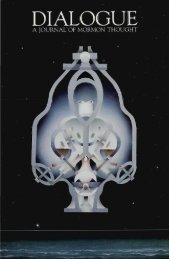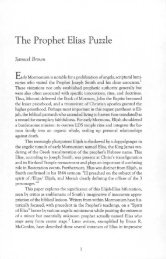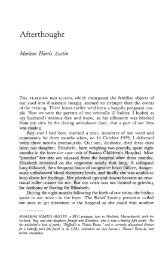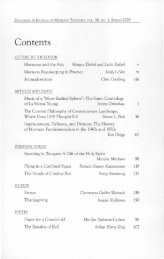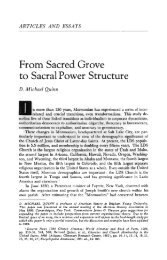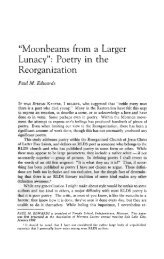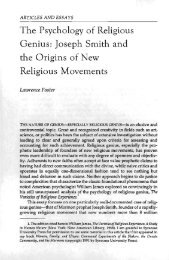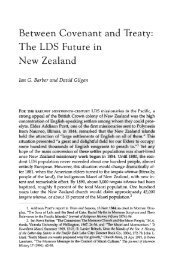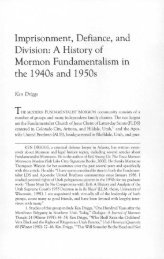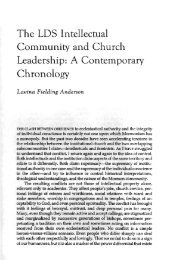Dialogue, Volume 25, Number 2 - Dialogue – A Journal of Mormon ...
Dialogue, Volume 25, Number 2 - Dialogue – A Journal of Mormon ...
Dialogue, Volume 25, Number 2 - Dialogue – A Journal of Mormon ...
You also want an ePaper? Increase the reach of your titles
YUMPU automatically turns print PDFs into web optimized ePapers that Google loves.
50 DIALOGUE: A JOURNAL OF MORMON THOUGHT<br />
cept <strong>of</strong> leader and gave them the leadership qualities necessary in the<br />
Church's bureaucratic system. Missionaries were also strongly discouraged<br />
from working with Quechua-speaking villagers, who constituted<br />
35 percent <strong>of</strong> the nation's population, unless they came to the city.<br />
When a Church draws its members from one social sector, conflicts<br />
and tensions among members limit conversions from other social<br />
sectors (Hamilton 1962; Nordyke 1982). The students in San Juan told<br />
me that the Church has a facho image: in Argentine usage that can<br />
mean middle class, although elsewhere it also means "right wing."<br />
This is a rather accurate description, it seems to me, <strong>of</strong> the cultural<br />
norm and <strong>of</strong> the social pretensions and desires <strong>of</strong> many, if not most,<br />
Latter-day Saints on the continent. The Church is different from groups<br />
that direct their attention to the poor, whose worship reflects the<br />
experience and culture <strong>of</strong> the poor. Even in poorer Latter-day Saint<br />
congregations, I have heard dreams <strong>of</strong> upward mobility and a distinctly<br />
middle-class message.<br />
Cultural differences, as well as social differences, can be the root<br />
<strong>of</strong> conflict and misunderstanding. Every Latin American society is<br />
socially and ethnically plural, and wide cultural gulfs separate one<br />
region from another. At one point, Church leaders called an Argentine<br />
to be the mission president in Bolivia. Because the cultural norms<br />
guiding his behavior were foreign and <strong>of</strong>ten insulting to Bolivian members,<br />
they disliked him. Even within Bolivia, the gap between an uppermiddle-class,<br />
Spanish-speaking leader and the rural Indian-speaking<br />
congregations can be filled with misunderstandings.<br />
The fifth dynamic is the role <strong>of</strong> belief and creeds in religion. Like<br />
many Protestants, Latter-day Saints tend to define themselves in terms<br />
<strong>of</strong> their beliefs. Beliefs stand as emblems that distinguish us from other<br />
groups and form the ostensible focus <strong>of</strong> missionary work. Nevertheless,<br />
this kind <strong>of</strong> belief is a relatively new concept in much <strong>of</strong> Latin<br />
America (Knowlton 1988). Protestantism has spread there simultaneously<br />
with political groups, who also identify themselves by their<br />
beliefs and their ideologies <strong>of</strong> nationalism and individualism. These<br />
have been built out <strong>of</strong> the religion <strong>of</strong> the masses, which focuses on<br />
quasi-magical practices and festivities.<br />
How has <strong>Mormon</strong>ism fit into this religious and social frame? Is<br />
<strong>Mormon</strong>ism contributing to the growth <strong>of</strong> individualism, and hence to<br />
the fragmentation <strong>of</strong> society? How important are <strong>Mormon</strong> beliefs in<br />
the context <strong>of</strong> our religious practices? How do <strong>Mormon</strong>s separate<br />
or integrate their <strong>Mormon</strong>ism with other aspects <strong>of</strong> their life? What<br />
among <strong>Mormon</strong> beliefs do Latin Americans select as they reconstruct<br />
<strong>Mormon</strong>ism to make it meaningful to them? How does <strong>Mormon</strong>ism<br />
relate to popular, folk religion? Is our ideology really the most important



